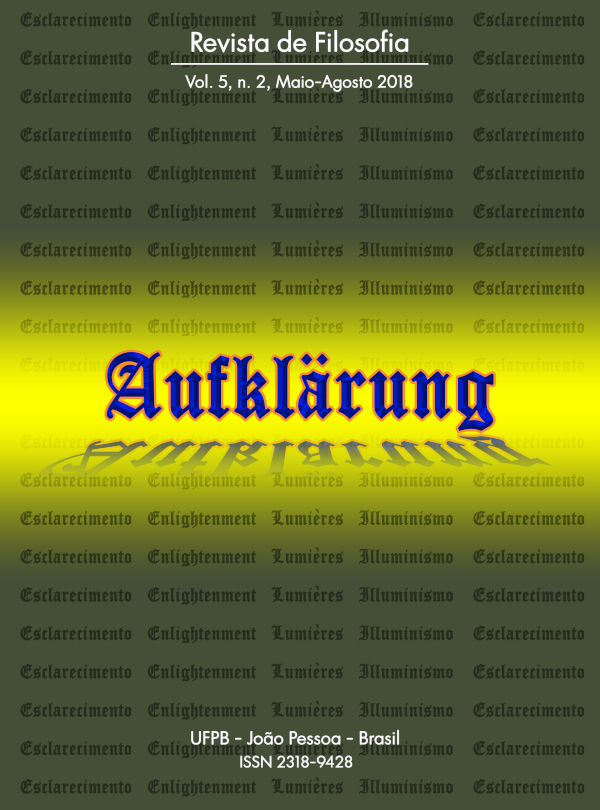Can there be alternative-facts? Hannah Arendt’s answer and its political implications
DOI:
https://doi.org/10.18012/arf.2016.41956Palavras-chave:
Truth, facts, . Politics, opinion, Hannah ArendtResumo
This paper addresses the current discussion on “alternative-facts” and public lying focusing on Hannah Arendt’s take on the relation between truth, reality and politics. It argues that much of what is assumed as novel and unexpected in the ongoing discussion has been anticipated by Arendt in the 1950’s and the 1960’s. Furthermore, it states that her insights and categories provide a deeper understanding of the matter, thus contributing to dismiss common dead-locks in recent debate. Still, there are, in Arendt’s analysis, perplexities – explored and unexplored by her – that deserve our attention in order to grasp the nature of facts and truth. In this line, this paper answers the question put forward in its title – Can there be alternative-facts? - relying on a (Arendt inspired) defense of objective truth, which requires a specific definition of politics and some qualified ontological claims about political reality.Downloads
Referências
ARENDT, Hannah. Between Past and Future: eight exercises in political thought. New York: Penguin Books, 2006.
ARENDT, Hannah.Eichmann and the Holocaust. London: Penguin, 2005
ARENDT, Hannah. The Human Condition. Chicago: The University of Chicago Press, 1998.
ARENDT, Hannah.The Jewish Writings. Edited by Jerome Kohn and Ron H. Feldman. New York: Schocken Books, 2007.
ARENDT, Hannah.The Origins of Totalitarianism. London: Penguin Classics, 2017.
ARENDT, Hannah.Washington’s ‘Problem-Solvers’ - Where They Went Wrong. New York Times, New York, 5 April. 1972. p. 45
BIRMINGHAM, Peg. A Lying World Order: political deception and the threat of totalitarianism. In: BERKOWITZ, Roger; KATZ, Jeffrey; KEENAN, Thomas (Org.). Thinking in Dark Times: Hannah Arendt on ethics and politics. New York: Fordham University Press, 2010, p. 73-77.
CARR, Edward H. What is History? Penguin: Middlesex, 1986.
FACKENHEIM, Emil L. Encounters Between Judaism and Modern Philosophy: a preface to future Jewish thought. New York: Basic Books, 1973.
HILBERG, Raul. The Destruction of the European Jews. New York: Harper & Row, 1961. KEAN, John. Post-truth politics and why the antidote isn’t simply fact-checking and truth. In: The Conversation, mar. 2018. Disponível em: http://theconversation.com/post-truth-politics- and-why-the-antidote-isnt-simply-fact-checking-and-truth-87364
KOHN, Jerome. Hannah Arendt’s Jewish Experience: thinking, acting, judging. In: BERKOWITZ, Roger; KATZ, Jeffrey; KEENAN, Thomas (Org.). Thinking in Dark Times: Hannah Arendt on ethics and politics. New York: Fordham University Press, 2010, p. 179-194 LIFTON, Robert J. Thought Reform and the Psychology of Totalism: a study of ‘brainwashing’ in China. Chapel Hill: The University of North Carolina Press, 1989.
LIPSTADT, Deborah E. The Eichmann Trial. New York: Schocken Books, 2011. VOSOUGHI, Soroush; ROY, Deb; ARAL, Sinan. The spread of true and false news online. In: MIT Initiative on The Digital Economy, mar. 2018. Disponível em: http://ide.mit.edu/sites/default/files/publications/2017%20IDE%20Research%20Brief%20Fal se%20News.pdf
Arquivos adicionais
Publicado
Como Citar
Edição
Seção
Licença
Política de Direito Autoral para os itens publicados pela Revista:
1.Esta revista é regida por uma Licença da Creative Commons aplicada a revistas eletrônicas. Esta licença pode ser lida no link a seguir: Creative Commons Attribution 4.0 International (CC BY 4.0).
2.Consonante a essa politica, a revista declara que os autores são os detentores do copyright de seus artigos sem restrição, e podem depositar o pós-print de seus artigos em qualquer repositório ou site.
Política de Direito de Uso dos Metadados para informações contidas nos itens do repositório
1. Qualquer pessoa e/ou empresa pode acessar os metadados dos itens publicados gratuitamente e a qulquer tempo.
2.Os metadados podem ser usados sem licença prévia em qualquer meio, mesmo comercialmente, desde que seja oferecido um link para o OAI Identifier ou para o artigo que ele desceve, sob os termos da licença CC BY aplicada à revista.
Os autores que têm seus trabalhos publicados concordam que com todas as declarações e normas da Revista e assumem inteira responsabilidade pelas informações prestadas e ideias veiculadas em seus artigos, em conformidade com a Política de Boas Práticas da Revista.






































